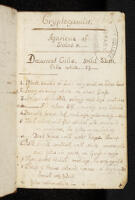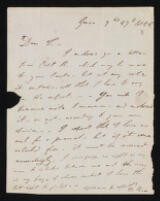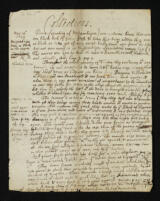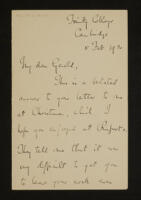On the fly-leaf are some lines of poetry partly pencilled and then inked over, partly in ink originally. On the fly-leaves at the other end are further fragments in ink and pencil, and one is headed: ‘Plan of a Poem. The Seasons. | Spring. The Visitation, &c.’ Other verses in pencil are on blank pages in the body of the volume, which consists of botanical notes, predominantly on fungi. At the other end is the date 23 Sept. 1793.
Crabbe, George (1754-1832), poet and Church of England clergymanGenoa.
23 Bruton Street, W.—In Mrs Pethick-Lawrence’s case the proper course would probably be to move the King’s Bench on the ground of informality in the proceedings rather than to ask a question in Parliament.
Has nearly finished writing his book A Levy on Capital.
Explains why he thinks capital a more suitable measure for a special tax than income.
—————
Transcript
21st. June, 1939.
Dear Nash,
It was a great pleasure to see you at dinner the other night but I was sorry not to have had the opportunity of explaining to you the little point regarding which you asked my view, namely, why I think that capital rather than income is a suitable measure for a special tax. My answer is twofold.
First, I think in general that both capital and income are measures of a man’s capacity to pay. Apart from death duties which only operate after a man’s death, all the burden is laid on income and to such an extent that the most elaborate devices are resorted to to enable a man to avoid taxation. I doubt whether very much steeper income taxation can be adopted successfully without finding some new principle to prevent evasions in future. A tax on capital avoids some of these difficulties.
Secondly, for the purpose of the emergency it is the capital position about which I am most concerned. We shall of course all agree (as I said in my speech on the Budget Proposals) that you cannot make shells out of the title deeds of wealth and you must depend on the margin of income over expenditure for the purpose. But this margin will be spread over the community in various proportions according to accidental circumstances. Whereas the people who ought ultimately to pay are the people of great wealth. This is reinforced by the fact that, in the case of the very rich, income tax, surtax (even without any allowance for insuring against death duties) already take a very large slice of income and it would not be physically possible to take much more. Whereas if the tax is regarded specifically as a tax on capital there is no reason whatever why in this emergency they should not be called upon to hand over part of their title deeds of wealth and so prevent a serious increase in the national debt.
Yours sincerely,
[blank]
The Hon,† Walter Nash,
Savoy Hotel,
Strand,
London, W.C.2.
—————
† Sic.
11 Brighton Terrace, Icknield Street West, Birmingham.—Has returned to Birmingham with his sister after an absence connected with some sad news. Is pleased that Lawrence has begun doing something. Discusses the progress of work on the Newark bridge and the arrangements at the works. Henderson is ill.
(Black-edged paper.)
—————
Transcript
11 Brighton Terrace | Icknield St. West | Birmingham
1st. Oct. 1851
My dear Lawrence,
I have your kind note of the 15th. Ult. before me & feel quite ashamed of my neglect, but I have had so much to do & think of these last few Weeks, I can scarcely realize the time which has elapsed.—I returned here on the Monday Night with my Sister by the Mail Train,—just a week after I had first heard the sad news.—My reason for coming back so soon was because I knew my presence was wanted at the Works,—& Mr. Henderson had behaved so kindly in the matter, I did not like to appear taking any advantage.—The change of Air seems to have done my Sister much good,—although she is necessarily very lonely. I however persuaded her yesterday to pay a visit to some Friends who reside at Handsworth, & were very anxious to see her.—I think a little society every-way beneficial,—as my eldest Sister Mrs. S— is very far from well, I fear my Sister’s visit here must be short, her return to Town is already besought.
I intend if possible to take her up myself as I wish to pass a day or two in Town.—
I am very glad to hear you have commenced doing something, although you speak so vaguely I have but little information on the subject,—it is too bad of you to keep one in such suspense.—Why not tell me where & what you are building.—I suppose it will all come in time.
So you see your friend H. G. is at last a liveryman. I have heard nothing of yourself or how you came off—or rather whether you ventured to stand the test.
The Newark Bridge is getting on most dreadfully slow,—& I do not think it will leave our Works for another 3 Months.—There is great difficulty in rolling some [of] {1} the Links for it,—it is still under my entire Charge & I have been at Newark several times setting out Foundations, & arranging the plans & contract for the staging.—
I get on very well with Mr. Henderson, & am not any way mixed with the draughtsmen,—who at this place are a very seedy lot, & for the most part badly paid, & bullied dreadfully they never see Henderson,—but have their orders, through an old Chap who keeps the drawings.—I on the contrary am privileged to enter his rooms when I have occasion, receive all my instructions direct, & am now generally employed, getting out rough sketches & designs under him,—& which the draughtsmen have afterwards to make drawings of.—
When I add to this, that my Salary has been raised as promised & all my back Money paid,—you will suppose I have nothing much to complain of at present,—indeed I am myself quite amazed at my good fortune, when I contrast the treatment I have received with many of those around.—
You will of course recollect old Mowatt of “savage” memory—if I recollect aright he left our Works because of his temper.—Well I should say his temper & his conceit has been the ruin of him do you know that Chap positively got “Henderson” his situation at these Works first,—& now is himself there at the rate of 25s– per Week,—working from 8 oclock in the Morning till 7 at Night, if this time is not made it is all deducted from the said money.
The Chap is as good a draughtsman as ever, but he drinks occasionally, & is fearfully obstinate & altogether has fallen irretrievably he is now also quite a Misanthrope & inveighs with stern energy against such “upstarts” as myself for instance, or in fact with anybody who is happy & contented or speaks a good word of Henderson or gets more tin than him.
For the bye speaking of Mr. H.—I am sorry to tell you his health is very precarious & at times he appears in great pain.—Yet such is his indomitable spirit he will not give up working, for instance,—the other night he was so ill whilst conversing with me he was obliged to send for his Carriage & go home, abt 4 oclock in the afternoon,—saying he would finish the matter with me the next Morning.—Judge my surprise in half an hour to receive a summons to go to his house upon arriving there,—he had just had a warm bath, & was lying on the sofa—& he kept me talking on several matters for 2 hours,—before he would go to bed.—
I fear to have bored you a great deal by the egotism I seem to have displayed in writing so much abt myself—really I do not mean it,—& it is but an apology for a better subject. Should you deem me able to afford you any information you might require I think you will do me the justice to beleive†,—it would confer the greatest pleasure on me to be able to assist in anything whatever.—
Hoping to hear from you soon,—& with my kind regards to your family,
Believe me as ever,
Yrs. Faithfully
Joseph Phillips
—————
{1} Omitted by mistake.
† Sic.
Kensington. Invites him to dinner
(Carbon copy.)
Mansfield House, Canning Town, E.—Sends New Year’s greetings. Describes his visit to Coblenz.
7 Carlton Terrace. Has received note and 2 volumes, is expecting Mrs Everett from America
(With an envelope.)
—————
Transcript
Trinity College | Cambridge
5 Feb. 1930
My dear Gerald,
This is a belated answer to your letter to me at Christmas, which I hope you enjoyed at Rupert’s. They tell me that it was very difficult to get you to leave your work even to go and see your family, so I don’t know whether I can induce you to come here some time from Saturday to Monday. So far as I can see ahead, any date would suit me; but during term, that is down to the middle of March, it would be necessary for me to know some time beforehand, as I might not be able to get you a bed in College.
I hope the arrangements which you were trying to make about the D. Sc. have turned out successfully.
Your bad language about the English climate is really rather ungrateful, for it appears from statistics that last December was the sunniest within human memory.
I had plenty to eat and drink at Christmas, and consequently am quite well, as I hope you are.
Your affectionate godfather
A. E. Housman.
[Direction on envelope:] Gerald Jackson Esq. | 85 Oakley Street | Chelsea | London S. W. 3.
—————
The envelope, which bears a 1½d. stamp, was postmarked at Cambridge at 9 p.m. on 5 February, and has been marked in pencil
‘5 feb 1930’.
Chines. Is in poor health
Women’s Cosmopolitan Club, 133 East 40th Street (New York).—Sends news of her activities in the United States.
—————
Transcript
Circular letter.
Women’s Cosmopolitan Club, 133 East 40th Street
Nov. 2.
Well! Since I landed at New York on Monday a week ago, I have not had a dull minute. I’ve really been thrilled all the time. So far, I have not begun to sort up my impressions at all—I am much too taken up with receiving them.
This morning I was invited to attend the Children’s Court. {1} Judge Hoyt is the permanent Acting Judge in this Court. He is the grandson of Chase, {2} who was a Member of Lincoln’s Cabinet, a man, thirty-five years of age—Conservative in politics but in this matter of reform an enthusiast. He has been educated to his present position by Miss Doty a solicitor & barrister who at present holds an official position as one of the Prison Commissioners. Arriving at the Court, seats were placed for us beside Judge Hoyt who explained the cases to us & handed us the wonderful dossiers supplied with each little offender—giving all details as to parents, character of home, school-record—health record—standard of living & every conceivable fact to be ascertained with regard to the child, his conditions & surroundings.
The Judge has a personal talk to each child brought before him & encourages the child to talk to him & to confess his fault. {1} If confessed, he can deal with the matter without any formality. If the offence is denied, the procedure of a trial with witnesses has to be gone through—but it is very informal—the group stands right in front of the Judge—face to face—& there are no police to be seen, unless it is the officer who has arrested the culprit, then he comes up to give his evidence like anybody else & goes away again as soon as his witness is ended. The Parents of the child stand just within call—and the Probation Officers who have first won the confidence of the children, stand beside them to encourage them or to confer with the Judge.
There are 26 Probation Officers attached to the Court, besides missionaries of very denomination—there is also a Guild of “Big Brothers” which the Judge himself has founded—each Big Brother taking voluntary friendly charge of some wayward little brother & trying to pull him through the critical period of his life.
Every child is put under probation for a certain number of months, only in very hopeless cases is he (or she) sent to a Reformatory—as the Judge holds that almost any sort of a home is better for a child than a semi penal institution. The parents are visited & helped by sympathy & advice. About 10,000 children pass through this Court per annum & the greater percentage of these turn out well under the system. A new Children’s Court is now being built—here the Judge’s bench is begin done away with entirely, & he will see every case alone—in conference with probation officers, parents etc. Waiting rooms are large airy & comfortable & a special waiting room is set aside for Mothers with babies. We saw 7 cases dealt with in an hour & a half. Most of these were remanded—or were being dealt with at a a second or third hearing after being thoroughly investigated in the meanwhile.
In one case a little boy was arrested by the police intolerantly & in an ill judged way. The small boy gave his version of the story to the Judge, obviously sincerely & truthfully, & his word was taken & the boy was discharged quite kindly & left the Court. Judge Hoyt is very proud of the record of the Court for the last four years. Speaking to Miss Doty he said. We have done this thing between us. “You educated me & I have educated the Court.” {1}
He would like to have Miss Doty as Assistant Judge to deal especially with the girls. But that would need a Bill being passed in the Legislature, as Women Judges are not yet admitted into the scheme in New York State. There is some hope of such a Bill being passed before very long.
We returned to lunch with Miss Doty & had a most thrilling talk. Before taking up the duties of Prison Commissioner—Miss Doty went to prison for a week as an ordinary criminal. No one knew of her identity except the Head Commissioner who sent her to Sing Sing Prison under the escort of two police officers. Some of her stories of prisoners were simply wonderful. One about a man who was executed for a murder, (in her opinion the man was innocent of the charge) was the most touching I ever heard. They made a compact together to use his story to help save “the kids” & he was writing this story for her up to the very moment that he was taken from his cell for execution. Many other stories she told us till we had to tear ourselves away to keep the next appointment. Tomorrow is the anniversary of her voluntary imprisonment & she is dining with us & we are going together afterwards to the Night Courts, to see how New York attempts to deal with its women prostitutes.
Subsequently today I had an interview with Miss Mullholland who is trying to get a Bill introduced in the Legislature to alter the law that deprives American women of citizenship upon their marriage with aliens. This she thinks will be taken up & passed owing to the women’s votes in the Western States.
Tomorrow the Elections will take place & we shall know how many more Suffrage States are to be added to the record.
This letter only deals with a few hours out of one day. And every day is full.
My own work is going on all the time too. And when I am not listening & learning—I am talking & laying down the law!
I am going to Boston, Washington & Chicago shortly. At the latter place we are invited to stay with Miss Jane Addams at Hull House.
Now I must go. Love & greeting to the circle of dear friends at home.
Emmeline Pethick Lawrence
Yesterday was a typical day. Here is my Diary—
10. a.m. Interview—Mrs Chapman Catt
1.30 Luncheon[.] Miss Lewisohn & friends.
4.0 Tea. Miss Doty & a large circle.
6.30 Dinner. Miss Stanton Blatch.
—————
{1} Full stop supplied.
{2} Salmon Portland Chase (1808-1873). Judge Hoyt was the son of Chase’s youngest daughter, Janet, known as ‘Nettie’.
Observatory - There is not a word about undulations in the papers by William Herschel on Newton's rings, in the Philosophical Transactions for 1807 and 1809 respectively: 'I have been observing the following curious phenomenon. If Newton's rings be produced by two glasses, however they be viewed the central spot is black. But if a glass be placed on metal, and viewed with polarised light (polarised to plane of reflection) then up to the polarising angle the central spot is black, and instantly beyond that it is white. This I anticipated from Fresnel's [experiments]: it is confirmatory of them, and defies emissions'.
Slough - JH has sent WW's paper to Davy 'with the character it merits (for he cannot read it) - one of the neatest applications of algebraic analysis I have seen' ['A General Method of Calculating the Angles Made by Any Planes of Crystals, and the Laws According to which They are Formed', Phil. Trans., 1825].

























![Letter from Jean-Charles-Leonard de Sismondi to Lady Charlotte [Bury]](/uploads/r/trinity-college-library/5/2/7/5277578642d3a41412e175802661c9786dbb426dc790e5b92cd6dd1c6bf16fc6/025.SRMS.B15.10.front.tmb.jpg)



